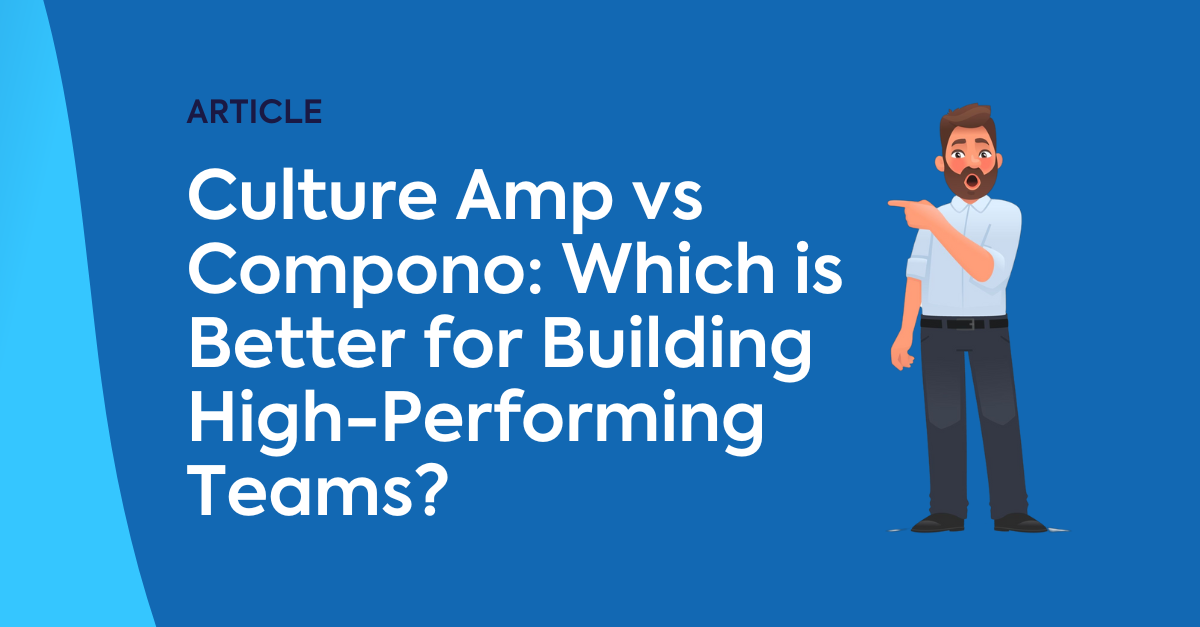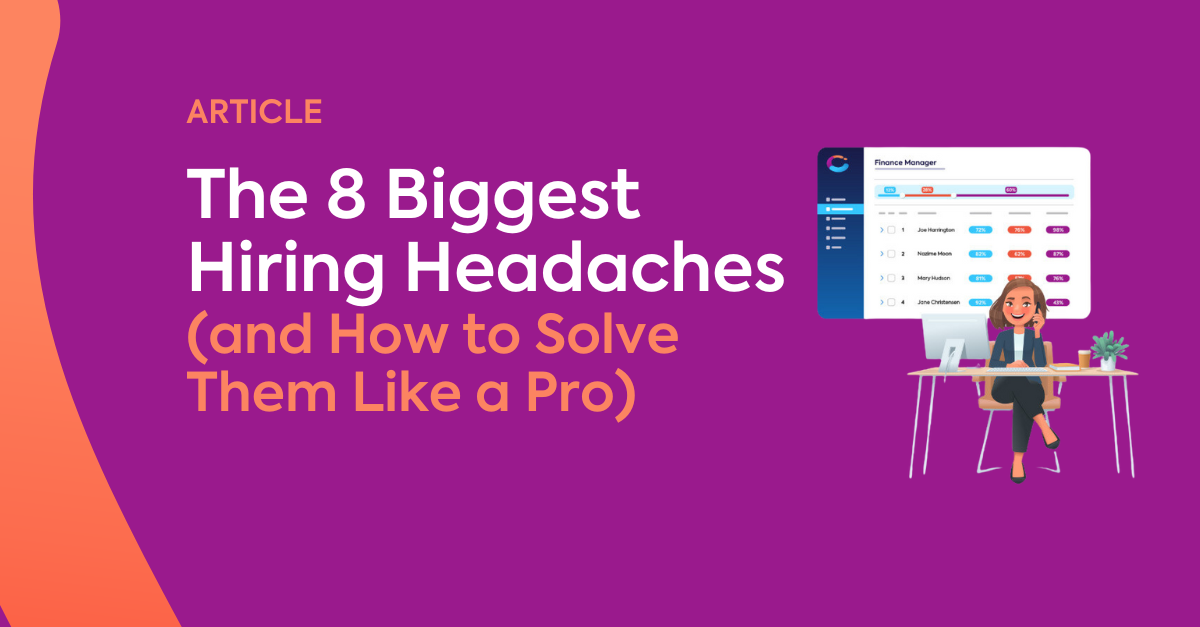Culture Amp vs Compono: Which is Better for Building High-Performing Teams?
If you're an HR leader or business decision-maker focused on creating high-performing teams, you've likely encountered both Culture Amp and Compono....
Become the expert on delivering
valid and fair assessments for
your training and education.
Hey Compono helps you understand your personality and how to turn it into your superpower.
First 1,000 users get 10 minutes free.
Just $15 a month after that — cancel anytime.

In 2009, I co-founded, built and led one of Australia’s largest and most successful technology start-ups, Temando. In 2017, after seeing through the final stage of a successful trade sale exit, I decided to move on and focus on my next ventures.
An exit forces a founder to reflect on the journey, and for me this has been a hugely transformational experience. The knowledge, lessons learnt, and connections gained only serve as an even stronger foundation that allows a founder to ensure the next venture is bigger and better than the first.
“One of the biggest lessons I have learnt in my Temando journey is the need to both attract and retain strong talent. To ensure that those hired have the necessary characteristics to succeed in the relevant roles, and don’t just look good on paper and present well in an interview.”
We all have an unconscious bias to hire people most like us, and these people aren’t always the right people for the role. In talking to fellow founders and executives alike, this appears to be the biggest challenge impacting the growth potential of companies of all sizes, which is a pain point I feel passionate about solving. There are a number of experiences (some positive, some negative) I had in my Temando journey that led me to this conclusion. Like all good stories, it’s best to start at the beginning.
The early days of a start-up are nothing short of electric. Filled with hopes, dreams, passion and enthusiasm — there is an adrenaline-charged feeling like nothing can get in your way. Sure, money is tight, and no one knows who you are (yet!), but to a founder they are all solvable problems with hard work and tenacity. For me, this energy was like a magnet in attracting talent, as it was a grassroots opportunity to work at an exciting venture-backed start-up, and certainly one of the only ones at the time in Queensland.
I remember how painful it was hiring the first 20–30 people. I was reading literally 100’s of resumes every week, trying to find diamonds in the rough. Interviews were also taking up my extremely valuable (and limited!) time. I was very involved personally as I wanted to ensure we only hired people that fit the culture we were trying to define at the time.
In the beginning, a company’s culture is largely shaped by the founders and driven by the early employees. Upon reflection, I definitely had a cognitive bias (anyone I personally hired was most likely extroverted and got bonus points for having side hustles). I’d like to think that the first people we hired were amongst our best hires, loyal, passionate and true believers of the vision (who would become known as “the originals” later in the journey). Many are still there today, and of those that left, many went on to work for other awesome companies such as Demandware and Spotify, while others went on to found their own respective businesses. In retrospect, hiring was a huge management overhead in terms of time. It lacked any real objectivity or analysis in terms of personality-fit or culture-fit, but somehow, perhaps by luck — we ended up with some great people. And with no middle management in an entrepreneurial culture — it was a lot of fun.
“When I’ve spoken to other CEO’s and asked at what stage did their culture start to change, the answers are always pretty consistent. “When we hit 50 people, then when we hit 100 people.”
My experience was no different — once you hit 50 people, while you can still be involved in the process of hiring, your business is probably at a scale that you can’t “own it” — meaning you will likely start to rely on others to do the leg work. At 50 people, you also can’t physically talk to everyone each day, and it is most definitely impossible to directly manage every person.
Hal Gregersen, Ph.D., the executive director of the MIT Leadership Centre, states the optimal number of direct reports is somewhere between six and 12, whether you’re the CEO or a lower-level manager (1). This means that at 50 people, you need to start to think about bringing in professional managers to share the management overhead, if you haven’t done so already. Having worked at large corporations early in my career, I had a natural disdain for corporate cultures with undue process and politics, and did my best to resist that for as long as possible to keep Temando nimble and fun.
Eventually, and especially after you attract venture capital, and even more so if you are a young founder, your investors and/or board will push you to hire some older, more experienced managers. Some are no-brainers, like a CFO — as a level of governance and strong financial controls are essential. Other CxO’s may or may not add value, depending on the hire. Jordan Peterson, Professor of Psychology at Toronto University states that 65% of managers add zero or negative net value to the company (2).
In my experience the first CxO’s you hire can make or break your business. In my case, it almost broke it. My board at the time encouraged me to hire a senior C-level executive which turned out to be the biggest mistake of my career, and later served as my primary inspiration to co-found Compono. The individual we hired presented extremely well in interviews, and had some extremely good experience on paper. The individual came highly recommended by one of our investors, which served as additional due diligence. Their current employer, despite being a very large corporation (which in retrospect, we should have thought about as a major consideration before hiring someone for a start-up) was regarded as an employer of choice. It was a senior role, and we had many of our team involved to try and ensure a balanced opinion.
Before we made the decision, we were very divided on the shortlist. We struggled to find anyone in Australia with material experience. We found some brilliant candidates overseas — but none were perfect, some we thought would be a perfect fit culturally — but lacked the experience. Others had the experience, but we had questions about the cultural fit (although truthfully, we had no way to measure or score it other than subjective thoughts and “gut feel”). In the end, we opted for the candidate with the experience, and what a disaster it was.
“Within a week, my instincts knew that we had made a mistake.”
I remember going to my board and saying “this person is not right, they’ve got to go” and them saying, “Carl, you’re impulsive, give them time to settle”. I’ve always respected those more experienced than I, and truthfully, I can be impulsive — but in hindsight, I should have trusted my gut. Within a few weeks, this individual was telling staff that they were hired by the board to take over my role (which was not only a categoric lie, but constitutionally not possible given my shareholding at the time). They had taken over hiring, insisting on hiring a HR function that would report to them, and as I was overseas at the time, I had very little influence on the new starters.
Very quickly the company was divided between new employees loyal to this individual vs. originals loyal to me and the business vision and culture I’d created. For a short while this created a toxic culture. It increased our employee turnover and cost us some major customers by the time I was able to convince the Board to allow me to take action. At which point the individual already managed to secure another job (using all our accomplishments to date to their credit) before I could fire them. Overall, one bad hire caused millions of dollars of damage, lost us valuable time to market (honestly, to the degree I think we could have grown 10x larger if we didn’t lose this time), and caused some of our best people to leave.
The positive to come out of this experience was the learning opportunity. I used it to focus my energy on hiring a great HR function, creating clearly understood cultural values we all live and breathe, and even going as far as to implement basic psychometric testing (limited due to the costs) to help screen for both cultural and person fit characteristics. However, the problem I quickly found is while there are tools that exist to improve recruitment processes and performance testing, none solved the bias of interpretation of test results, and gave a single holistic view of the candidate around suitability of skill, qualifications, and organisation fit (including organisational culture fit, job fit, and person fit).
To this regard, I teamed up with one of Australia’s leading corporate psychologists whose PhD research focuses on organisational culture and employee performance. Specifically, understanding how psychometric tools can be used to evaluate culture, job, and person fit while also predicting performance. What started off as a passive side project to solve the challenges I saw firsthand at Temando, has now raised more than $1.5M in total seed funding and built an envious pipeline of global clients as it begins to go to market.
It feels like an opportune time to be in the market for better hiring. Whether you are a start-up fumbling across hires using pure luck and spending your very limited resources in trying to make the decision, or a later stage business trying to eliminate the cognitive bias in your hiring decisions with a view to build more effective teams and a positive culture (i.e. trying to avoid the mistakes that those such as Uber has made in the past) — Compono is designed to help you identify and hire the right people.
References
(1) Apple CEO Tim Cook now has 17 direct reports — and that's probably too many, Business Insider
(2) "65% of managers add zero or negative net value to the company" Jordan Peterson
Published: 17/12/2018

Compono Hire helps you predict job-fit and team-fit using behavioural science, so you can shortlist with confidence.
Request a demoBuilt for mid-market hiring teams.

Voice-first coaching that adapts to your personality. Get actionable steps you can take this week.
Start freeBuilt by Compono. Not therapy — practical behaviour change.

If you're an HR leader or business decision-maker focused on creating high-performing teams, you've likely encountered both Culture Amp and Compono....

6 min read
Finding the right person for your team often feels like solving a puzzle where the pieces are constantly changing shape. You need someone who...

Whether you’re leading a thriving business or managing an HR department, chances are you’ve faced the uphill battle of hiring. It’s a process with...